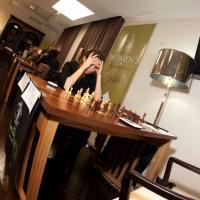
How to Play a Tournament
Once again, I will deviate from the topic of my chess column – exchanges. In this column I will present some thoughts on practical tournament strategies based on my own experience. There is much advice of what to do when one does not do well in the tournament: change something, keep fighting, chose a different opening strategy, etc. What to do when you do well in the tournament? With the so-called pressure that the leader has to carry? I have tons of experience starting a tournament with 0-2 and coming back with a streak of wins… Having 3-0 does not happen often but I ended up with that many points last weekend in the annual King’s Island Open tournament, which was held in Ohio. I played the three rounds against 2100 players who managed to beat 2300s and 2200s, so they were dangerous opponents. So, me and GM Ben Finegold had 3, while GM Perelshtein had half a point less and IM Brian Smith one point less- a good situation to be at. Playing a grandmaster in the fourth round and hoping to win some prize money is not a situation I recommend anyone to be in. But if the goal of the tournament is just to play good people and learn from them then this is an ideal situation.
I prepared some line five minutes before the game and was incredibly lucky because Ben ran into the line, which he never played before. He spent 1 hour, while I spent 15 min., when we reached the final position GM Finegold offered me a draw. What to do? I have a better position, he ran into my preparation, I know that the position is far from winning but the attack is dangerous. I have more time and black has to spend tons of time to find the correct defense. My thought process in the final position was the following: “hmm a draw, means if Perelshtein wins he gets to play Ben while I get someone with a 2300 rating- nice!, but my position is sooo good, I would waste this great preparation, and my coaches will kill me after the game, and he is low on time…. But if I can draw a GM it wouldn’t be much trouble to do well in the last round.” Wrong, all wrong… this is the moment where I put a cross on my tournament. They say: where there is a draw, a loss will follow. I thought too much about the tournament situation instead of simply playing chess and hoping for the best. I felt guilty after the game for accepting the draw. I knew that there was a good chance I would make a mistake and he would outplay me, since he is a better player, but I had to play out a better position. Below is the game.
So, the last round situation: me and Ben 3.5, he plays Perelshtein as we thought and I play a 2300 player, Seth Homa. A draw gives me a class prize, a win tie or clear first. I was very nervous before the game because I really wanted to with this open tournament. I think that it was the right decision to play for a win in this game, since to play for a draw usually loses the game. So, I felt aggressive and went for a full point. If there is a chance to win the tournament one should go for it. Here is the analysis of the game.
A disappointing loss, but totally deserved. Playing more calmly, being flexible with ideas, instead of concentrating on the one idea of the knight sacrifice, I could have played Ne4 and gotten a pleasant edge. I wanted a game won in a nice, attacking style and over-evaluated my position; and the penalty for that was a loss. At the end I would like to show the game that was played in the last round between two grandmasters. Ben was defending with white the whole game. He managed to draw in the end. I came to think that Grandmasters differ from non-GMs in the ability to make a draw when needed. Offering me a draw in the previous position was a good practical chance. While, having great technique and tons and tons of patience to draw the game presented below truly reflects chess class.
In the end, sometimes tournament winners are not the ones who try to win at all cost but those who are smart enough to offer a draw. Risk is good but unnecessary risk is pointless. Thus, only by having this experience I came to the conclusion that winning chess tournaments requires not only good chess moves but also knowing when to take a draw and when to play for a win.






